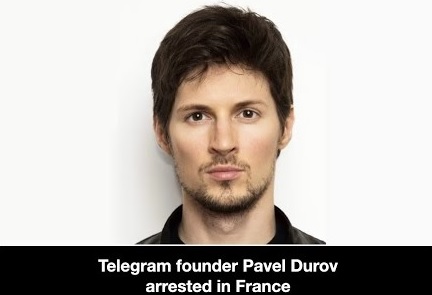France has made a significant legal move with its new law aimed at tech executives whose platforms enable illegal activities,
Effective January 2023, the groundbreaking legislation positions France as a leader in the battle against cybercrime. It allows for criminal charges against tech executives, including Telegram CEO Pavel Durov, for their involvement in crimes committed via their platforms.
Durov is currently under formal investigation in France and could face up to 10 years in prison and a fine of €500,000. He has denied the allegations, stating that Telegram complies with EU regulations.
Officially named LOPMI (Loi d’Orientation et de Programmation du Ministère de l’Intérieur) 2023-22, this unprecedented law is still untested in court, making France the first country to target tech executives in this manner.
According to the GIP Digital Watch Observatory team, the LOPMI law outlines a €15 billion plan over five years to tackle future security challenges by enhancing human, legal, and budgetary resources.
The initiative aims to modernize operations through digital transformation, with nearly half of the budget allocated for digitizing services, updating investigative tools, and strengthening responses to cybercrime.
The law is expected to create 8,500 new jobs, improve recruitment diversity, and double the presence of police and gendarmes by 2030.
It also focuses on crisis management, particularly for civil security and climate events, while bolstering public order for significant international events like the 2024 Olympics. Additionally, it aims to enhance border security using advanced technology and collaboration.
“There is no crime in U.S. law directly analogous to that and none that I’m aware of in the Western world,” says Adam Hickey, a former U.S. deputy assistant attorney general.
Hickey, now with the U.S. law firm Mayer Brown, noted that U.S. prosecutors could charge a tech executive as a “co-conspirator or an aider and abettor” in user-committed crimes, but only if there’s evidence that the operator intended for users to engage in criminal activities and actively facilitated them.
He referenced the 2015 conviction of Ross Ulbricht, who ran the Silk Road website that facilitated drug sales. U.S. prosecutors argued that Ulbricht “deliberately operated Silk Road as an online criminal marketplace… outside the reach of law enforcement,” leading to his life sentence.
While the U.S. has prosecuted individuals like Ulbricht for their direct involvement in crimes, French law seeks to hold platform operators accountable for illegal activities on their sites, even if they are not directly involved.
Paris prosecutors, led by Laure Beccuau, have praised the law as a crucial tool against organized cybercrime, including child exploitation and credit card trafficking.
The recent investigation into Durov and the closure of platforms like Coco highlight France’s strict approach to online crime. The J3 cybercrime unit, overseeing Durov’s case, has also tackled significant cases, including those related to Dominique Pelicot and the Coco chat forum.
Despite its potential, the novelty of this law may lead to legal challenges. However, it represents a significant escalation in the global fight against cybercrime.
The Arrest of Pavel Durov, Founder of Telegram
Pavel Durov, the Leningrad-born founder of Telegram, an encrypted messaging app popular among Russian speakers, was arrested by French police after his private plane landed at Le Bourget Airport near Paris.

The charge carries a potential maximum sentence of 10 years and a fine of €500,000 ($556,300).
According to sources cited by France’s TF1 TV channel, various Western intelligence agencies, including Israel’s Mossad, had been monitoring him.
The 39-year-old, who reportedly holds multiple citizenships, including those of France and the United Arab Emirates, was detained in connection with an investigation into allegations of fraud, drug trafficking, organised crime, terrorism promotion, and cyberbullying on Telegram.
Last month, a French judge formally placed Durov under investigation, charging him with multiple offenses, including the 2023 charge of “complicity in the administration of an online platform facilitating illicit transactions in an organised group.”
While Durov remains under investigation, questions emerge about the future of social media platforms like Telegram, which have branded themselves as advocates for privacy and free speech.
Conversations among lawmakers, tech leaders, and civil society organisations are intensifying, emphasising the need to balance resources for online security with the protection of users’ rights to free communication.







